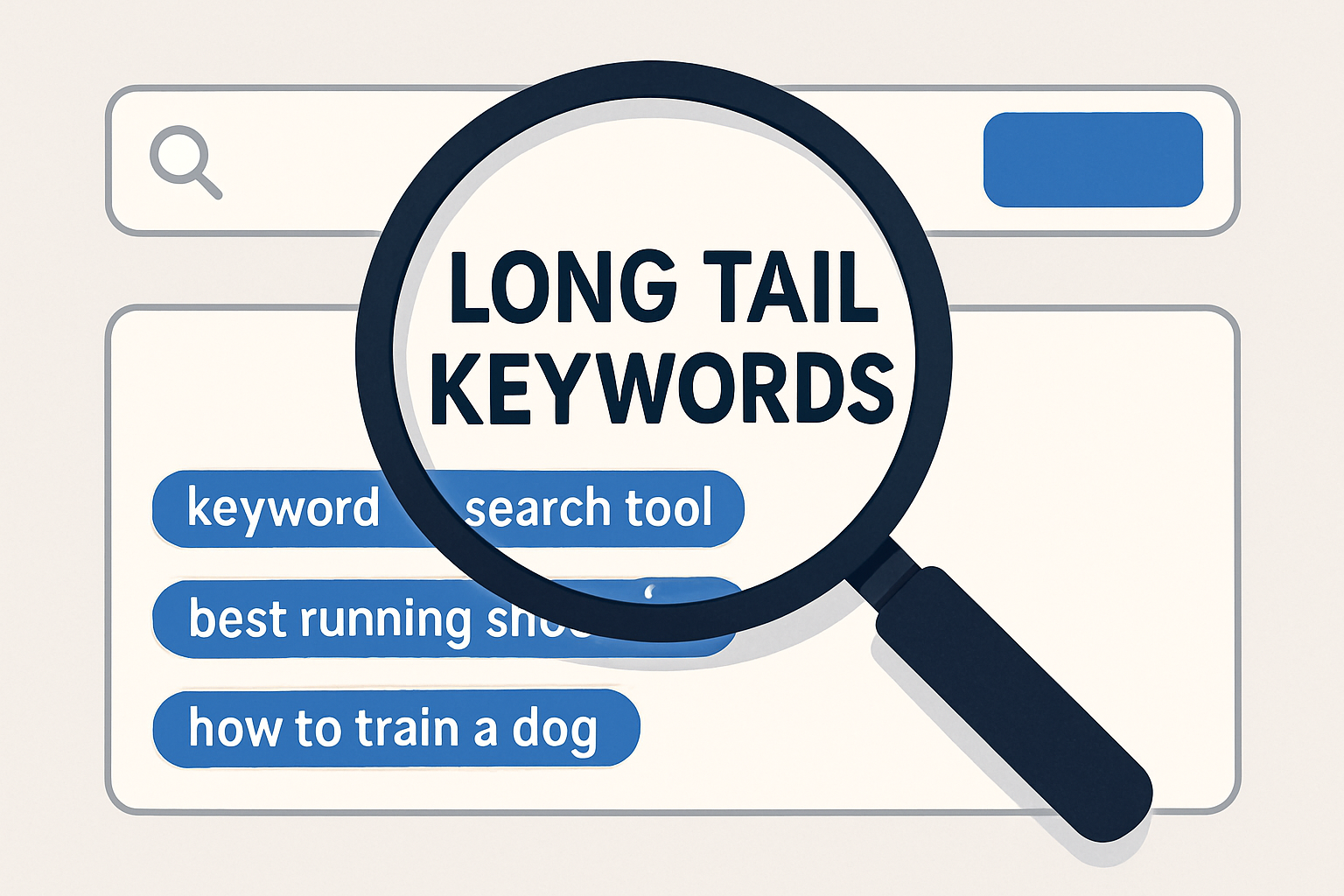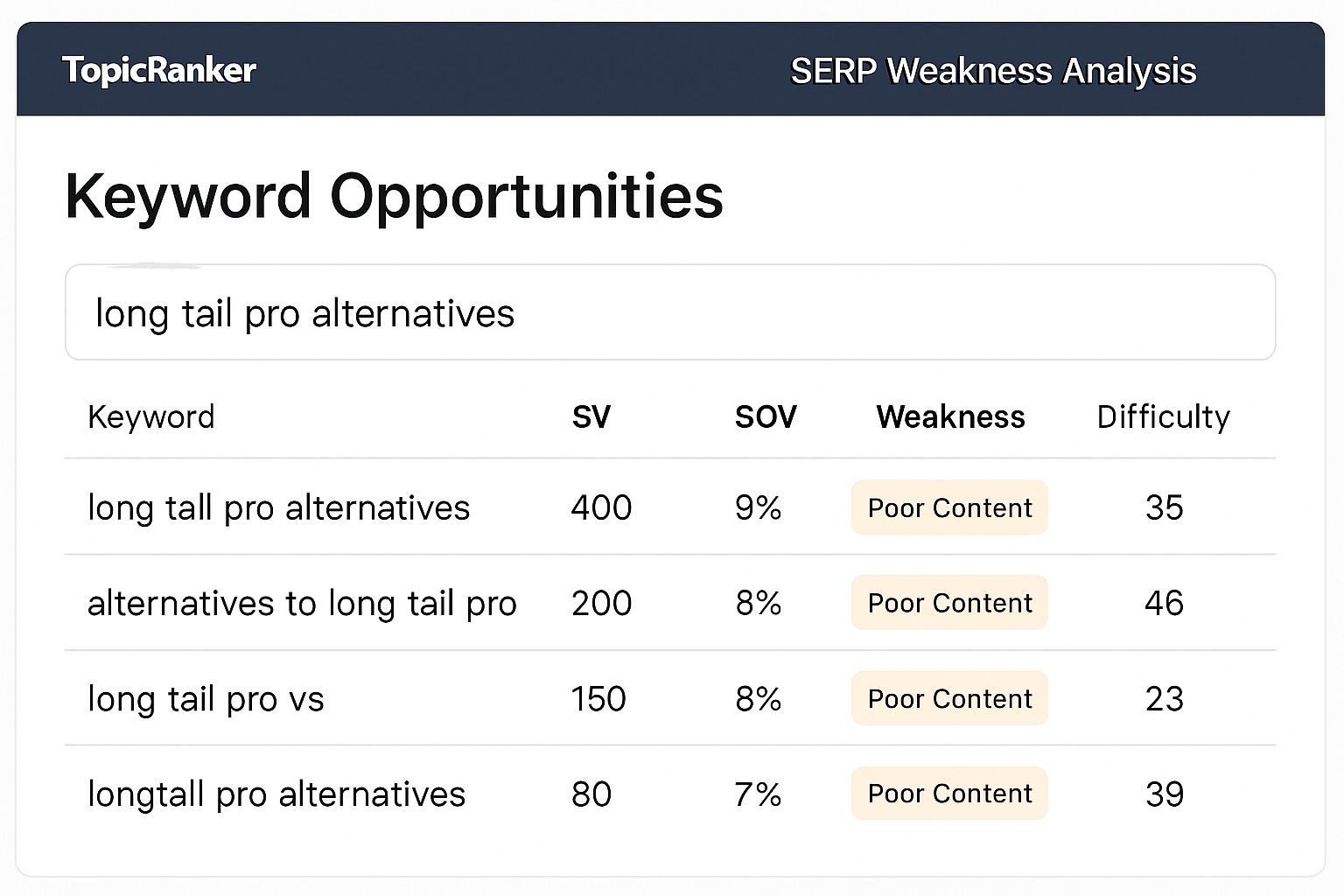Long Tail Pro was a staple for many SEO professionals seeking to uncover low competition keywords efficiently.
But what happens when that tool suddenly disappears?
This article offers a complete cheatsheet of the best long tail pro alternatives available in 2025.
Some are feature-rich platforms with comprehensive SEO toolkits.
Some are budget-friendly options perfect for small businesses and startups.
Some provide innovative approaches to keyword research that consider SERP weaknesses.
Some focus on ease of use and fast results.
Some stand out because of their community reviews and reliability.
Let's dive right in.
Why Long Tail Keywords Matter in SEO
Long tail keywords are the hidden gems in SEO. Unlike high-volume head terms, these keywords usually have lower competition, enabling content creators to rank faster and more consistently.
Think about it. Instead of trying to rank for "shoes," targeting "affordable running shoes for flat feet" can attract highly qualified traffic. It matches specific search intent and often results in better conversions.
That’s why tools that specialize in finding long tail keywords, like Long Tail Pro once did, have been invaluable for SEO strategists and niche site builders alike.
But not all keyword tools are created equal. Understanding what long tail keywords bring to your SEO efforts is crucial before jumping into alternatives.
Ready to optimize with precision? Long tail keywords are your secret weapon to dominate less crowded SERPs.

Long Tail Pro Shutdown Explained
On June 5, 2024, Long Tail Pro’s website and software went offline and have remained inaccessible since March 3, 2025. The company officially confirmed that the business will not continue operations.
This came as a shock to many users who depended on the platform for bulk keyword research focused on low competition long tail keywords.
Founded in 2011 by Spencer Haws and sold in 2016, Long Tail Pro was praised for its simplicity, ease of use, and ability to generate large keyword lists from seed keywords. However, its reliance on a difficulty score that didn’t always reflect SERP content gaps meant it sometimes led users astray.
Instead of only looking at competition metrics, modern SEO requires tools that analyze actual SERP weaknesses — areas where your content can exploit ranking opportunities.
So, now that Long Tail Pro is gone, where should digital marketers turn? The answer lies in alternatives that address these limitations with better data and usability.
Criteria for Choosing a Long Tail Pro Alternative
Selecting the right alternative depends on several key factors:
- Keyword Discovery Power: How well does the tool find long tail keywords with ranking potential?
- SERP Analysis Depth: Does the tool highlight competitor content weaknesses on existing search results?
- Pricing & Value: Is the cost worthwhile for the features offered, especially for small businesses?
- Ease of Use: Does the platform provide an intuitive interface and actionable reports?
- Additional SEO Utilities: Features like backlink analysis, rank tracking, or site auditing add extra value.
- Data Accuracy: Does the tool provide reliable keyword metrics without discrepancies?
Remember, no tool is perfect. Personal preference and specific use cases drive the best choice. Most importantly, maintain a "test and change" mindset — try a few, then pick what works best for your workflow.
Quick question: Have you evaluated how your current keyword research tool stacks up against these standards?Top 8 Long Tail Pro Alternatives Reviewed
Here we break down the leading contenders to replace Long Tail Pro in 2025, detailing their unique strengths and pricing.
1. TopicRanker – The New Gold Standard
TopicRanker stands out as the most innovative alternative. Rather than relying solely on difficulty scores, it detects real SERP weaknesses to help you find keywords where competitors truly falter.
This method drastically improves your chance of ranking quickly by focusing on tangible content gaps.
Pricing starts at just $19 per month, making it budget-friendly.
Founder Dmitry has built this tool leveraging years of SEO and PR experience, helping 300+ brands reach #1 rankings.
This is why the founder of Backlinko called TopicRanker the "future of keyword research."
Learn more about TopicRanker here.

2. Semrush – Comprehensive and Trusted
Semrush is a robust all-in-one SEO platform with excellent keyword research tools. It offers insights like search volume, intent, CPC, competitor keywords, and content gap analysis.
Rated 4.5 stars on G2 with over 1800 reviews, its reliability is proven.
It's pricier than others but well worth it for agencies or enterprises that want a full SEO arsenal.
Semrush’s competitor research excels in exposing untapped keyword opportunities by revealing gaps in competitors’ content, allowing you to build targeted strategies accordingly.
See detailed user experiences and Semrush pricing on Reddit’s SEO community.
3. SE Ranking – Feature-Rich and Affordable
SE Ranking combines well-rounded keyword research, site audits, rank tracking, and backlink analysis, making it a solid mid-tier option.
Its keyword suggestion tool analyzes your domain and competitor keywords to deliver actionable keyword lists. Unique keyword grouping helps avoid repetitive entries, saving time.
SE Ranking is rated 4.8 stars on G2, reflecting high user satisfaction.
4. KWFinder by Mangools – User-Friendly Interface
KWFinder is ideal for traditional long tail keyword research with a clean interface that reveals search volume, difficulty, CPC, and top-ranking competitors.
It’s part of the Mangools suite, including tools like SERPChecker and LinkMiner, to assist comprehensive SEO efforts.
This option balances usability and power with a fair price point.
5. Keysearch – Budget Option with Caution
Keysearch stands out as a bargain at $17 per month. It covers basic keyword research, competitive analysis, rank tracking, and a content assistant.
However, extensive user reports highlight keyword data inconsistencies compared to premium tools.
It's useful for beginners demanding simple research but avoid treating all data as gospel.
6. Wincher – Local Rank Tracking Focus
Wincher specializes in rank tracking, especially for local SEO across thousands of locations.
It provides some keyword research but isn't centered on it, making it a niche choice for businesses heavily focused on geographic targeting.
7. Keywords Everywhere – Browser-Based Simplicity
Keywords Everywhere works as a browser extension, providing quick keyword insights such as volume and CPC.
Its affordability and ease make it a decent honorable mention, but it lacks depth compared to full web platforms.
8. Seomator – Starter with Free Tool
Seomator offers a simplified keyword research tool for free, great for quick insight and beginners testing waters.
Upgraded versions add more SEO features but might lack depth for advanced research.
Each alternative has unique strengths. Your personal needs, budget, and team skillset will ultimately decide the best fit.
Pro Tip: Try monthly trials where available. Use real projects to test accuracy and reporting quality before signing up long term.How TopicRanker Innovates Keyword Research
Unlike traditional tools relying on generalized keyword difficulty scores, TopicRanker dives deep into the SERP to uncover specific weaknesses and gaps in competitors’ content.
This method involves:
- Reading the top ranking pages for your target keywords.
- Identifying errors, missing content, or sub-par optimization.
- Recommending keywords with known content vulnerabilities you can capitalize on.
This data-driven approach enables content creators to craft laser-focused, highly competitive content briefs that boost ranking chances dramatically.
Example: While Long Tail Pro could state "keyword X has low difficulty," TopicRanker shows if the current top results actually satisfy search intent or if content gaps exist to fill.
This makes your time and resources count.
Some SEO veterans say this tool saves them "hours of wasted content creation effort."
Explore TopicRanker’s full walkthrough for a closer look at this innovative process.

Other Noteworthy Alternatives
While the previous tools cover most users’ needs, some other offerings might match niche requirements.
Investigate all feature sets carefully before committing.
- Ubersuggest: Affordable and beginner-friendly but with less keyword depth.
- Ahrefs: Powerful, especially for backlink and site audit features, yet costly.
- Serpstat: Balanced SEO tool with decent keyword research capabilities.
Remember that pairing keyword research with solid content strategies, competitor analysis, and backlink efforts is key to SEO success.
Looking for cutting-edge content marketing ideas? Check out this guide on small business podcasts to complement your SEO efforts.
Tips for Switching Your Keyword Research Tool
Transitioning from Long Tail Pro to another platform requires a strategic approach:
- Audit Your Current Keywords: Export your existing keyword data to avoid losing your progress.
- Test Multiple Tools: Use free trials or demos to compare features and ease of use in your context.
- Integrate Gradually: Start using the new tool alongside your current workflows to identify strengths and gaps.
- Adjust Your SEO Plan: Update your content calendar and research based on insights from the new tool.
- Train Your Team: Make sure your content creators and SEO analysts understand the new tool’s functionality fully.
Switching tools can invigorate your SEO but requires discipline to maximize benefits.
Did you know? A misaligned keyword tool can lead to spending hours creating content that won’t rank – focus on tools delivering actionable data.Conclusion & Final Thoughts
The disappearance of Long Tail Pro leaves a gap but also opens opportunities in exploring superior long tail pro alternatives.
Budget-conscious marketers might prefer TopicRanker with its innovative SERP weakness detection or Keysearch for simple research.
Established SEO professionals seeking all-in-one solutions might lean towards Semrush or SE Ranking.
Whichever you choose, prioritize tools providing accurate, actionable insights over vanity metrics.
Finally, content quality combined with strategic keyword targeting drives SEO success—the tool is only the enabler.
Need guidance on SEO pricing or scaling your strategy? Explore our comprehensive SEO prices and ROI guide to plan your budget smartly.

What's Your Next Step?
Tell us in the comments: How will you apply this to your keyword research process? For personalized advice, contact us!